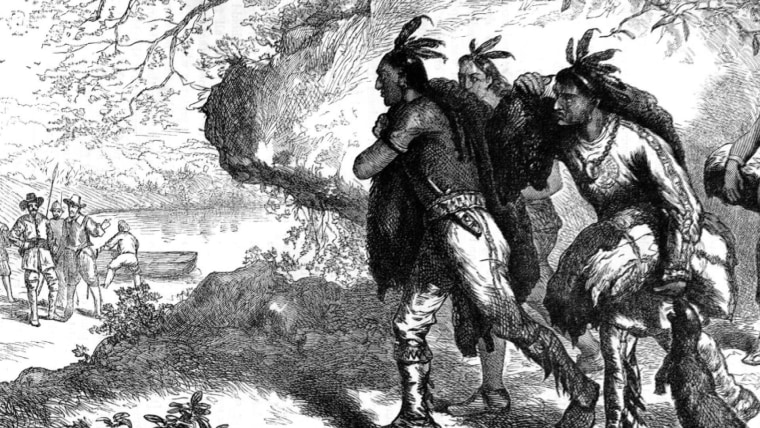“No new worlds.”
These words stand emblazoned 20 feet tall at the Plymouth harbor, on England’s southwestern coast, from where the Mayflower set sail to establish a new life for its passengers in America.
The art installation is one of several commemorations erected to mark the 400th anniversary of the transatlantic voyage Wednesday.
The anniversary comes as the United States and many other countries face a reckoning on racism, and some are highlighting the famous ship’s passengers’ enormous, and for many catastrophic, impact on the world they claimed.
The artists behind the work want to challenge the long-standing mythology around the Mayflower’s search for a “New World” by emphasizing people already lived in North America for millennia.
“It just feels extraordinary to me that 400 years later, it seems like the state that most of us are in is denying that history,” Léonie Hampton, one of the three artists behind the project, told NBC News. “That needs to shift.”
The story of the Mayflower is well known. The 102 passengers and approximately 30 crew of the Mayflower, who came from England and the Netherlands, set sail Sept. 16, 1620, and have commonly been portrayed as pilgrims seeking religious freedom, although their beliefs and motives were more complex.
After 66 days at sea they landed on Cape Cod, near what is now Provincetown. The Native American Wampanoag tribe helped them to survive their first winter — marking the first Thanksgiving.
More than 30 million people can trace their ancestry to the Mayflower’s passengers, contributing to its elevated place in American history.
But they were not the first European settlers to land in North America and their interaction with the Wampanoag did not remain peaceful. Subsequent decades saw waves of European diseases kill many of the Native Americans and rising tensions led to bloody wars.
Many Native Americans of New England now call Thanksgiving the National Day of Mourning to reflect the enslavement, killing and pillaging of their ancestors.
Download the NBC News app for breaking news and politics
“It’s important to get history right. It’s important to understand that the truth matters,” said Steven Peters, a member of the Mashpee Wampanoag tribe and creative director of the marketing firm SmokeSyngals, who is involved in the commemorations.
While the European settlers kept detailed documents of their interactions and activities, the Wampanoag did not have a written language to record their experience, Peters said, leading to a one-sided historical record.
The Wampanoag had suffered a deadly plague in the years prior to the Mayflower’s arrival with as many as 100,000 people killed, Peters said, which could help explain why they pursued alliances and support from the settlers.
A colonial perspective undermines not only the tragedies Native Americans endured, but also their contributions to history, David Stirrup, an American literature and indigenous studies professor at the University of Kent, argues.
“Some of the people who helped the pilgrims survive that first winter had already been to Europe. Some of them were fluent in English. They weren’t an uncharted peoples sort of waiting for European contact.
“The native people played a quite considerable role in the development of the modern world, [they] weren’t just kind of agentless victims of it.”
Without those stories being corrected, particularly by Native Americans, harmful stereotypes can persist, Stirrup said.
“There is systemic racism that is still taking place,” Peters said, adding that harmful depictions of Native Americans continue to be seen in television, films and other aspects of pop culture.
The renaming of Washington’s NFL team in July after facing mounting criticism for using an anti-indigenous slur signals growing public demand for change, Peters said.
“This is a living history,” said Jo Loosemore, the curator for a Plymouth museum and art gallery, The Box, which is hosting an exhibit in collaboration with the Wampanoag nation.
“It’s living history for descendants of the Mayflower passengers. But if you’re particularly a Wampanoag Native American, this is living history in the sense that you are still living with the impact of colonization,” she said.
Native Americans continue to fight for their land rights, Loosemore said. In July, the Supreme Court ruled in favor of Oklahoma’s Muscogee (Creek) Nation to uphold their treaty rights covering a huge swath of the state.
It’s not just indigenous issues that the Mayflower anniversary is unveiling, Loosemore said. It also reflects many of the current crises, including resistance to immigration, religion and cultural clashes and the destruction of land and resources that are contributing to climate change.
Those compounding issues, along with the coronavirus pandemic, are bringing the plight of Indigenous people in the U.S. and around the world into sharper focus.
“I think it can be argued that Indigenous peoples today are more under threat now,” the artist Hampton said.
Peters agrees 2020 could mark a turning point: “I think people absolutely are far more open to the damage that inaccuracies in our story, in our history, can cause.
“We think there’s an opportunity here to really sort of set the record straight.”












